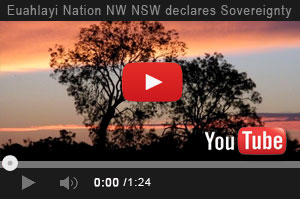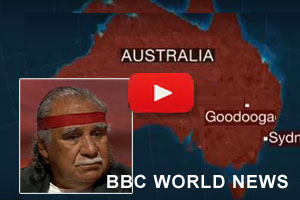QLD Supreme Court told: 'time does not erase murder'
| 5 May 2014 |
The real hidden agenda of the proposed referendum is to coerce Aboriginal Nations and Peoples to become part of the Australian Constitution and by doing so consent to be governed. The Commonwealth government can then claim that Aboriginal Nations and Peoples have acquiesced. This is the main weapon the Crown has to counter our sovereignty movement.

Michael Anderson, Pam Touma and Leon Winters of the Euahlayi Peoples Republic leaving the Supreme Court this week

23 May 2014
Michael Anderson said from Lightning Ridge today:
The Euahlayi rates cases that are before the Supreme Courts of New South Wales and Queensland are about land title and jurisdiction.
All sides agree that contested sovereignty is not justiciable in these domestic courts and the State Ministers with responsibility for land and the Shire Councils in each respective state do not contest this position in any way. Therefore the implications confirm that Aboriginal Nations and Peoples have standing and in this respect the Commonwealth and States cannot argue they have sovereignty and dominion over Aboriginal Nations and Peoples.
On Tuesday 20 May our Euahlayi Rates Case was before the Supreme Court of Queensland where the Balonne Shire and the Queensland Government admit they do not have any documents to show how Euahlayi allodial title to land was transferred to the Crown land tenure system. I reminded the Queensland Supreme Court that: "You cannot benefit from murder and that is what happened. Time does not erase murder."
The High Court Mabo No.2 judgment affirmed that Aboriginal 'Native Title' burdens the Crown's assumed radical title.

So how does the Commonwealth government's "Recognise" campaign for a referendum to the recognition of Aboriginal people as the preamble to the Constitution fit with the Sovereignty movement. The short answer is - it doesn't.
In respect to the millions of dollars being spent on the Recognise campaign, many First Nations people are asking: Who they are trying to convince – non-Aboriginal people or Aboriginal people?
If they are trying to convince First Nations people then what is the specific wording that is being proposed?
Surely those running the Recognise campaign must understand that it is criminally deceitful to conduct a campaign asking people to blindly support a referendum to change to the Constitution that does not specify the final wording. It is a proverbial case of putting the cart before the horse. We also know that our sovereignty position is excluded by the terms of reference of the Expert Panel on the Constitution.
The real hidden agenda of the proposed referendum is to coerce Aboriginal Nations and Peoples to become part of the Australian Constitution and by doing so consent to be governed. The Commonwealth government can then claim that Aboriginal Nations and Peoples have acquiesced. This is the main weapon the Crown has to counter our sovereignty movement.
For the Commonwealth Parliament to put the terms of an amendment to the Constitution to the Australian population, it must have the absolute free prior and informed consent of Aboriginal Nations and Peoples before that referendum can become valid, otherwise it is a unilateral action and will have no validity.
A Commonwealth debate on 1 April 1965 resonates with the current Constitutional debate.
When former Prime Minster of Australia, Sir Robert Menzies, addressed the Commonwealth Parliament 1 April 1965, he drew attention to the recurring issue of 'Aborigines' and the Constitution. Menzies was telling the people of Australia that if the word 'Aborigines' is taken out of the Constitution the Parliament would have no specific constitutional powers to pass laws for 'Aborigines'. Then the only way in which the parliament could make a law for Aboriginal Peoples was to treat them as aliens, that is non-citizens, and use the race power to pass laws 'for the Aboriginal race'.
Any federal legislation specifically directed at providing a Commonwealth service for Aboriginal Peoples must have as part of its definition an Act for the people of the 'Aboriginal race'. Without this definition all Commonwealth legislation relating to Aboriginal Peoples would be invalid. Sir Robert Menzies is recorded by Hansard as stating:
"...the removal of what has been called the "discriminatory provisions" of section 51. On that I would, with great respect, challenge the assumption that is made. May I read the provision to the House in order to refresh its memory. Section 51 states — The Parliament shall, subject to this Constitution, have power to make laws for the peace, order, and good government of the Commonwealth with respect to:— (xxvi.) The people of any race, other than the aboriginal race in any State, for whom it is deemed necessary to make special laws: It has been suggested that that provision discriminates against the Aborigines of Australia. I would have thought that the contrary was the fact. Parliament has been given power to make discriminatory laws in relation to the people of any race—special laws which would relate to them and not to other people; laws which would treat them as people who stood outside the normal grasp of the law, enjoying its benefits and sustaining its burdens in common with all other citizens. I would have thought that the perfect state of affairs in Australia would be that any Aboriginal citizen felt that he did stand equal with every other citizen before the law, enjoyed its benefits and took his own part on a proper basis in sustaining its burdens. I have no doubt whatever that this provision in the Constitution was designed having regard to conditions that existed at that time and the possibility of having to make a special law dealing with, for example, kanaka labourers—perhaps a special law to deport them from .the country or to confine them to some particular area. There was a good deal of discussion about this at the time this provision was framed. Therefore the framers of the Constitution inserted this provision, but they left out the Aboriginal race because they did not want to discriminate against the people of the aboriginal race. All we have to do now is to cross out this reference "other than the aboriginal race" and we confer on this Parliament a power to make a special law which relates to the Aborigines and to no other people. ... If you do not mind I want to pursue this. I do not think it is at all out of place. There is a second point about it, and this does concern me. If the Commonwealth, as one of its heads of power under section 51, has the right to pass special laws with respect to the Aboriginal race, I wonder what limitations will be on that separate head of power. Would this enable the Parliament to set up a separate body of industrial laws relating to Aborigines or some other kind of law— health laws, quarantine laws or laws under any of the other powers of the Parliament? It may well be true that it could because, make no mistake about it; this would be a head of power standing not inferior to any other power contained in section 51. That is a matter that requires a great deal of thought. I do not want honorable members to think that I have arrived at some positive conclusion about it. I am raising it here in order to indicate that it wants a good deal of thought and that we would want to give it a great deal more investigation than we have before we favoured changing the provision in section 51. But we would be very happy to see the end of section 127".
In the same debate Mr. Beazley (Freemantle WA) further clarified the position of Aboriginal people being outside the Australian Constitution.
... but I do suggest that a whole series of discriminatory laws with respect to Aborigines is necessary. We say that we do not intend to discriminate. What rubbish! Aborigines have been occupying land in various parts of Australia since time immemorial. Yet we deny them the slightest entitlement to one square inch of that land and push them off it as soon as anything of value to a European is discovered on it. At the same time, we content ourselves with this mealy mouthed statement that we do not discriminate against Aborigines. I think that, in the sense of material standards, we have almost the worst native policy in the world. I can never join in the righteous denunciations of South Africa that we hear in this House, because, from what I have seen in South Africa, the material conditions of the natives there are immeasurably higher than the material standards of the Aborigines of Australia. There is a case for the Commonwealth Parliament to have power in relation to Aborigines. Those of us who travelled over much of Australia and studied the conditions of Aborigines as members of the Select Committee on Voting Rights of Aborigines realise that anyone who would say that the States have been doing a marvellous job is either very blind or very complacent. I do not want to dwell on the matter any more except to say: For heaven's sake, if we in this Australian Parliament cannot guarantee citizenship, let us accept the fact that our Constitution acknowledges only the status of subjects of the Queen and that, no matter how many acts of Parliament we pass, we cannot reach into the States and create any form of meaningful citizenship. Until placitum (xxvi.) of section 51 of the Constitution is amended, Aborigines can have no effective Australian citizenship.

As can be seen from this we have been lied to with deceit to this day and the Commonwealth government employees modern day Black trackers to keep the dust flying to conceal the truth and the Recognise campaign is part of this.
We need to have lot more talk on our status as sovereign independent First Nations and Peoples otherwise, through acquiescence, everything Aboriginal People have fought for till this day will be given up.
Isn't it bad enough that they are asking you to give up all your rights through the Indigenous Land Use Agreements (ILUAs) process?
Even worse are the governments' 'Native Title by consent' where, in order to have the governments to sign agreements, you have to give up all other claims of right.
Don't be deceived for short-term gain. Why agree to be part of a racist Constitution from a foreign country – Britain – when we still hold and can assert our own sovereignty.
 Contact: Ghillar Michael Anderson
Contact: Ghillar Michael AndersonHead of State of Euahlayi Peoples Republic
Convenor and Joint Spokesperson of the Sovereign Union
of First Nations and Peoples in Australia www.sovereignunion.mobi
Ph: 0427 292 492, ghillar29@gmail.com,


